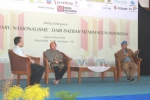Facing Challenges of the Age with Innovation and Collective Action in Building Cities

BANDUNG, itb.ac.id – Have you wondered about city innovations that might emerge in the era of disruption? Or how can cities develop and its limitation? Head of Regional and City Planning (PWK) Undergraduate Study Program, Ridwan Sutriadi, S.T., M.T., Ph.D explained it on Studium Generale KU-4078. Located at the West Hall of ITB, Studium Generale was held on Wednesday (1/22/2020). Ridwan Sutriadi presented his lecture with a topic named "Urban Planners: Between Innovation and Collective Action in Building Cities".
Studium Generale was opened with a speech by Vice Rector of General Administration, Alumni, and Communication (WRAAK) ITB, Dr. Miming Miharja, S.T., M.Sc.Eng., who is also a lecturer of School of Architecture, Planning and Policy Development (SAPPK) ITB. He gave an illustration of the process of city development. According to him, all of the faculties on ITB are contributing to develop the campus, so building cities is a joint work of all fields. "This is one of the implementations of collective action in building cities. The job of a planner (planologist or planner) is to be a conductor, defining the vision of urban development, and working hand-in-hand with other fields," he explained.
Building the Cities Together
Ridwan Sutriadi collected some questions from the participants. It varied from the best transportation in the archipelago, city indicators that could not be developed anymore, and impacts of relocating the capital city. The students seemed enthusiastic and expressed their curiosity.
First, he explained, the city is an area that was built for residence, work, visit, and tourism. The city also symbolizes the latest civilization of human being. As the development of science and technology, the meaning of the city becomes wider, not only cities that have a solid physical form, but also appeared in virtual.
Virtual city is a place where we communicate with each other, interact, and do our business without face-to-face. "With trends that always constantly changing, planners must think about the future precisely. We must be able to predict developments that might occur in the future, "he said.
Ridwan explained, there are four stages of future cities’ transformation, namely rudimentary, functioned, integrated, and scalable. First, cities seek to fulfill their needs and consider its availability, those fulfillment are done by adopting some modern solutions. After that, cities can fulfill its aspirative needs of all stakeholders and adopt a holistic approach to urban development. Finally, cities are ready to enter new challenges, and then adapt quickly through appropriate and proportional development scenarios. "In transformation of modern cities, there are three keys. Those are never stop learning, reinvent yourself, abd use your most powerful tools," he said.
Regarding its innovation, Ridwan stated that we need more than one "crazy" person to bring a breakthrough. He took an example of Banyuwangi’s transformation as a modern city from its mystic to majestic, “All of local residents of Banyuwangi made it happen,” he said.
He said that according to “Marketing Place” by Philip Kotler, cities are similar with flowers. One time, flowers will bloom, wither, and die. Another writer added, cities could continue to grow, but only in its sub-urban areas. However, Ridwan said the cities’ condition in Indonesia are not like that, the downtowns are still developing. A rapid and uncontrolled development should be slowed down or halted based on environmental considerations, although it is contrary to the perspective of investment. Therefore, Ridwan delivered an idea about smart-shrink development, "Smart-shrink development means we should not make it as a big city. If the city grows, land consumption will increase. So it needs to be slowed down," he said.
Ridwan also explained the networking of actors that have a role in urban planning, including the development of information technology allows some additional stakeholders. It also completes the meaning of collective work as previously explained by Miming Miharja.
Innovation is a provision to develop cities in an era that everything is changing rapidly and dynamically. Without the collective action, it will make more difficult and all of stakeholders from different fields are responsible to contribute and work together.
Translator: Billy Akbar Prabowo

scan for download







